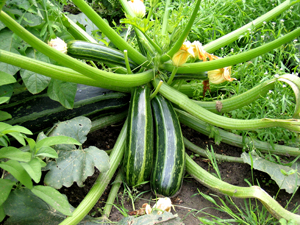 Whether you have been gardening for years or this will be your first organic vegetable garden, here are a few simple tips to help you enjoy yourself and grow a bumper crop of delicious, healthy food you’ll be proud of.
Whether you have been gardening for years or this will be your first organic vegetable garden, here are a few simple tips to help you enjoy yourself and grow a bumper crop of delicious, healthy food you’ll be proud of.
First, know what grows best in your area and in your soil. You can improve the quality of your soil greatly with an organic soil amendment such as MOO DOO® composted cow manure. However, you still need to understand whether your soil is sandy or contains clay, as this will influence what you plant. Take a sample of soil to your local garden shop and ask for guidance in which plants are best suited for your organic vegetable garden.
Once you find out what your soil will easily support, it’s time to consider your personal preferences. For example, if peas would do well in your garden but you don’t like them, perhaps they aren’t the best choice. You want to be able to eat (or give away) what you grow.
Now think about your climate. Gardening websites or seed catalogs will have a map that shows garden zones or hardiness zones. These take into account your climate and the length of your growing season to help you choose the best plants for your area. Following their planting recommendations will help you have a more successful garden.
Second, decide how you will control pests. When you have an organic garden, you’re limited in what you can use because many pest control items are full of harmful chemicals. One way to control pests is to introduce their natural predators into your organic garden. For example, if your area is prone to aphids, buy some ladybugs or green lacewing larvae to keep the pests under control.
Some plants, such as tomatoes, are prone to disease and fungus. For best results, buy varieties that are resistant to disease. Organic garden compost such as MOO DOO® aids in maintaining the ecological balance of your garden to help your plants resist pests and disease.
Third, never grow plants in the same place two years in a row. Certainly, you may be limited in the area you have, but rotate plant families so that you grow them in different parts of the garden each year, even if it’s just a few yards from last year’s site. This rotation will help protect against disease.
Fourth, thin out your crop on time. When it comes to having a successful organic vegetable garden, timing is crucial. If you’re a beginning gardener, pulling up extra plants may be counterintuitive, but trust us on this one: thinning the garden properly will enhance the quality and the quantity of your vegetables.
Overcrowded plants cannot thrive because they don’t receive enough water, fertilizer, and light. Disease and pests love crowded gardens. When you thin out your plants, the strongest ones survive and flourish.
Finally—and not all gardeners know this—companion planting helps you have a strong and healthy organic vegetable garden. Companion planting is carefully choosing plants that help each other grow or that protect each other from pests. For example, plants from the squash family grow well with beans and corn, and basil can help prevent pests from bothering tomatoes.
Organic vegetable gardening is simple, but like anything else, you need to know what you’re doing—do you have any tips to grow an amazing garden?




